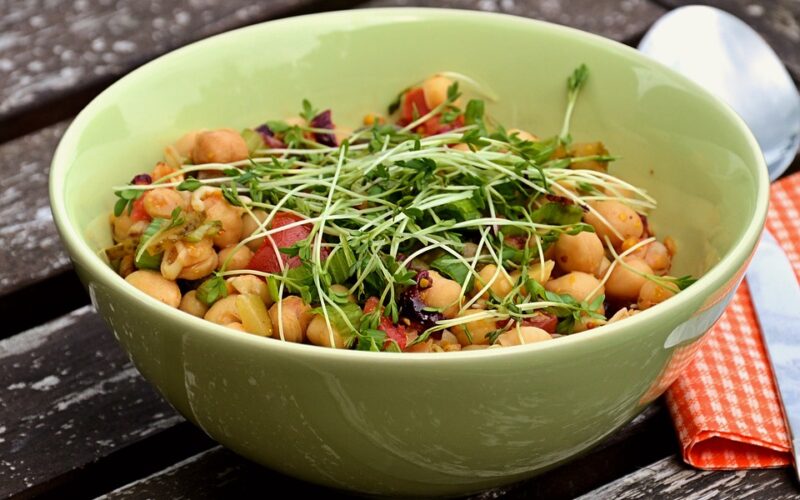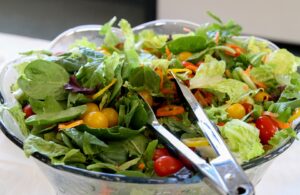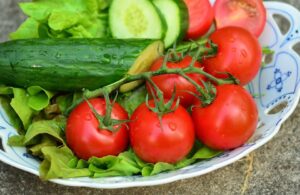Are you looking for ways to improve your nutrition and make healthier eating choices? Salads can be an excellent way to get essential vitamins, minerals, and fibre in one easy meal. Not only are salads delicious but they’re also incredibly nutritious.
Eating salads every day is a great option for those trying to boost their well-being as it provides many health benefits that could help potentially enhance overall health.
The benefits of eating salads on a daily basis
Eating salads on a daily basis provides an abundance of health benefits, from contributing to overall well-being to helping manage body weight. With an array of vegetables, proteins, and grains to choose from, salads are the perfect meal or snack for everyone who wants to reap the nutritional rewards.
Rich in fibre, vitamins, and minerals while being low in fat and calories, eating salads can boost energy levels due to their content of essential fatty acids and antioxidants.
Salads are also incredibly versatile, you can top it with your favourite salad dressing or nuts; add shrimp or avocado if you’d like extra protein; choose seasonal fruits and make it sweet; customize according to your dietary requirements; and enjoy a one stop meal that satisfies your taste buds as well as your body's needs.
Make delicious and nutritious salads quickly
Salad can be a great way to brighten up any meal, and it doesn't have to take long to prepare. Learning the basics of creating a delicious and nutritious salad can help you eat healthier and save time in the kitchen.
Start with a base like fresh greens or romaine lettuce or spinach and top it with some crunchy and colourful vegetables like cucumbers, bell peppers, tomatoes and julienned carrots. From there, add interesting flavours like olives, nuts, seeds or cheese and a protein such as grilled chicken or tuna for a nutrient-rich meal that doesn't take hours of cooking.
Finally, drizzle your favourite dressing over the top for extra flavour and a professional finish. With these simple steps you'll have a healthy salad that is both easy to make and full of gut-friendly goodness.
Alternative ingredients for more variety in your salads
Salads can be a great way to add much-needed vegetables and other healthy ingredients to your diet. But, why limit yourself? Consider incorporating alternative ingredients such as whole grains, legumes, nuts, and seeds into your salads for more variety.
Whole grains like freekeh, quinoa and couscous are packed with fibre and proteins and can provide an excellent crunchy texture in a salad. Adding legumes such as chickpeas or lentils not only adds taste but also increases the health benefits of any salad.
Nuts and seeds like almonds, walnuts, sunflower seeds, flaxseeds etc bring a nutty flavour along with plenty of healthy fats, vitamins and minerals, making any salad worth eating! So why not try something different? Let's broaden our palette by introducing alternative ingredients into our salads and make them even more enjoyable.
Different ways to dress up your salad
Salads are a great way to get your daily requirements of nutrients and vitamins, while also filling up your belly with some delicious flavours.
However, salads don't always have to be an unexciting plate of greens with a few croutons. With a little bit of culinary creativity you can turn your salad into something truly special. You can add grilled chicken for extra protein or toss in some roasted veggies for crunch; you can top it off with flavourful dressings like pesto or balsamic vinaigrette.
Fruits such as apples or pomegranates offer a great sweet twist to your salad, and chopped nuts provide the needed texture and energy boost. Plus, the possibilities are endless, so start experimenting with flavours and explore the endless ways to dress up your salads.
Healthy toppings that are high in fibre and vitamins
Eating right doesn't have to be boring. To make a meal more satisfying, try adding high fibre and vitamin rich toppings. Fibre helps support healthy digestion and helps regulate your blood sugar levels, while vitamins are essential for nourishing the entire body.
Ideas include adding diced avocado to tacos, topping salads with nutty sprouts, and squeezing lemon on fish or veggies for an extra zing of vitamin C.
With just a few tweaks you can up the nutrient content of any meal and keep it delicious.
Getting enough protein when eating salads
Salads can be a wonderful way to give your body the essential vitamins, minerals and other nutrients it needs. However, if you're relying solely on salads for your meals, it's important to add in protein so that you maintain a balanced diet and obtain adequate energy.
Protein can be added to salads in the form of grilled chicken, cold cuts or egg slices, all of which are delicious yet versatile enough to pair with any salad ingredients. Whether you opt for grilled wild salmon on a bed of fresh spinach or lunchmeat tucked between a few handfuls of mixed greens, make sure you're getting enough protein when eating salad and your body will thank you!




















